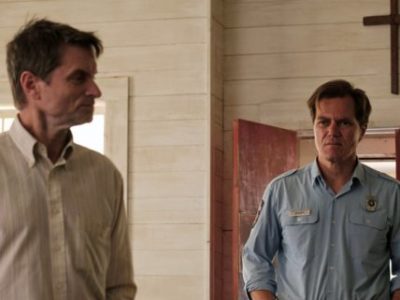Review| Manchester by the Sea, and Living with Death
 Sometime around Robert Ford, Casey Affleck began demanding attention. A great addition to the Ocean’s movies, and a wonderful performance in Gone Baby Gone notwithstanding, it was his portrayal as Robert Ford, the coward who assassinated Jesse James (or something like that) which cemented him in the minds of movie lovers that this kid has the chops. Nine years and surprisingly few movies later, Casey stars in this award coveting story of a man drawn into caring for his nephew after his brother dies.
Sometime around Robert Ford, Casey Affleck began demanding attention. A great addition to the Ocean’s movies, and a wonderful performance in Gone Baby Gone notwithstanding, it was his portrayal as Robert Ford, the coward who assassinated Jesse James (or something like that) which cemented him in the minds of movie lovers that this kid has the chops. Nine years and surprisingly few movies later, Casey stars in this award coveting story of a man drawn into caring for his nephew after his brother dies.
Earlier this year as Arrival began making waves, there appeared to be a very clear divide between people who thought it was absolutely amazing *raises hand*, and those who thought it was somewhere between pretty good and very good. That divide seemed to fall between those who had children, and those who did not. As a father of three I fit predictably into my appropriate group, and wondered how those other people could miss all the amazing qualities. Manchester by the Sea, while telling a solid story with terrific acting, could easily fall prey to similar divisions. Only this time the divide may be between those who have experienced a close, personal loss they have yet to get over, and those who haven’t. Manchester handles the prospect of living with the guilt of the death of a loved one with a tempered realism. It finds the characters stuck in the much of reality, and unwilling to bring themselves out of it, or accept efforts of others to pull them out.
Lee Chandler (Casey Affleck) gets the call that his brother Joe (Kyle Chandler) has died and must make the 90 minute drive to Manchester, MA (which is by the sea) to make the arrangements and bury his brother. Manchester is the home of the Chandler family. Joe was raising his son there, folks around town still recognize Lee when he comes back, and for much of the film we’re under the impression that something very important has happened to Lee in the past. It is with this “something very important” that I begin to see parallels with Arrival for how much people may enjoy this film. Lee had also once been raising his family in Manchester until one night when disaster struck and he lost all three of his children, and nearly his wife. This occurred in such a way that he felt incredibly guilty. Approximately 10 years later, he still does.
 Director and writer Kenneth Lonergan decided to tell this story through a disjointed timeline, separating current day events from scenes in which Lee recalls from his past revolving around this major incident of losing his family. This is a choice that may bother viewers at the start, but both phases are told in a progressive manner so it is not difficult to track. Truthfully, such a method for this particular film is probably the best way to approach it. Otherwise the film appears to be focusing on Lee losing his brother, which, while serving as an important catalyst, is not what the film wants its viewers to focus on. There are particular scenes that only work emotionally if we see them very soon before Lee is made to face old faces and old stories. But I’ll come back to that in a moment.
Director and writer Kenneth Lonergan decided to tell this story through a disjointed timeline, separating current day events from scenes in which Lee recalls from his past revolving around this major incident of losing his family. This is a choice that may bother viewers at the start, but both phases are told in a progressive manner so it is not difficult to track. Truthfully, such a method for this particular film is probably the best way to approach it. Otherwise the film appears to be focusing on Lee losing his brother, which, while serving as an important catalyst, is not what the film wants its viewers to focus on. There are particular scenes that only work emotionally if we see them very soon before Lee is made to face old faces and old stories. But I’ll come back to that in a moment.
The film begins with a focus on Lee at his job as a janitor for an apartment complex. His interactions with the tenants are indicative of how he has chosen to live his life. He’s indecisive in repair recommendations, he appears very unfulfilled by his work, and he makes no effort to connect with people even when they take the first steps. In a word, he’s stuck. It becomes clear later in the film that he means it to be this way. He has moved away from his family and childhood home, he’s taken a job which he can accomplish the required work while staying somewhat hidden, and he makes no effort to interact with people. In fact, what little interaction he does have usually comes in the form of a bar fight. There is something he’s forcing inward. Something he’s punishing himself for. Through the disjointed timeline revealing parts of his past while he interacts with people while arranging details around his brothers death, we learn that he feels intense guilt over the losses in his past. He feels responsible for it.
 Lee Chandler is living with death. He’s been carrying this burden around for years. There is a powerful scene after the incident where the police are interrogating him. They’re asking what happened, then they just let him go. This shocks him. He was already reserved to the notion of spending his life in prison, and he believed he deserved it. This was a burden he was prepared to bear, and it was a burden that rendered him socially disabled for the rest of his life. You might say he felt crushed by the weight of his sin.
Lee Chandler is living with death. He’s been carrying this burden around for years. There is a powerful scene after the incident where the police are interrogating him. They’re asking what happened, then they just let him go. This shocks him. He was already reserved to the notion of spending his life in prison, and he believed he deserved it. This was a burden he was prepared to bear, and it was a burden that rendered him socially disabled for the rest of his life. You might say he felt crushed by the weight of his sin.
Lee equated his actions with murder. And while the law and general morality wouldn’t place that charge on him, he carried it on himself. Forcing himself into solitude, he decided to carry it alone. He had no advocate. Lee’s story in Manchester by the Sea is one we can point to and show people the crippling weight of carrying our own burdens. We can look at Lee’s desolation, and explain it doesn’t need to be this way. We have an advocate to take on our sin and free us from the spiritual weight of it. Jesus is that advocate for us.
 As I described earlier, Manchester by the Sea has the potential for being an emotionally gut-wrenching film, and is told in a manner which heightens that potential. My primary problem, which in light of the final product is a somewhat minor one, is that for me that potential wasn’t fully realized. About 30 minutes into the film I distinctly remember thinking I would be crying before it was over. The tears never came. In fact, I can recall two scenes where if they had gone further with an emotional dump or breakdown, I would’ve followed right along. But it never reached that pinnacle. Lee never learns much about how to deal with his personal loss. There is never a real reconciling with anyone. He continues on as he has since the incident, so the result is a message of self-loathing and light masochism.
As I described earlier, Manchester by the Sea has the potential for being an emotionally gut-wrenching film, and is told in a manner which heightens that potential. My primary problem, which in light of the final product is a somewhat minor one, is that for me that potential wasn’t fully realized. About 30 minutes into the film I distinctly remember thinking I would be crying before it was over. The tears never came. In fact, I can recall two scenes where if they had gone further with an emotional dump or breakdown, I would’ve followed right along. But it never reached that pinnacle. Lee never learns much about how to deal with his personal loss. There is never a real reconciling with anyone. He continues on as he has since the incident, so the result is a message of self-loathing and light masochism.









Pingback: #121 – Manchester by the Sea and Agents of Grace | Reel World Theology
Pingback: Fizz’s Top 10 Films of 2016 | Reel World Theology